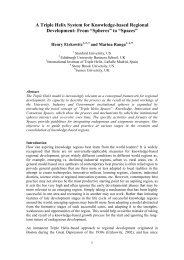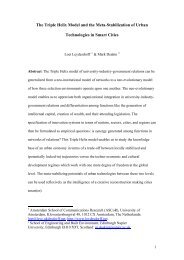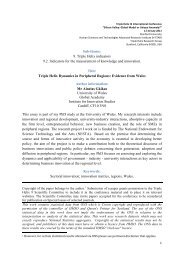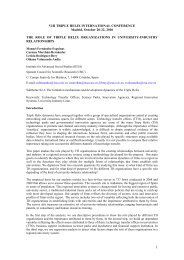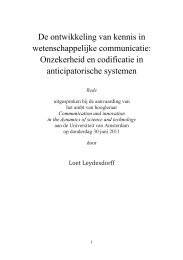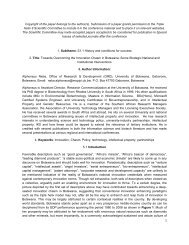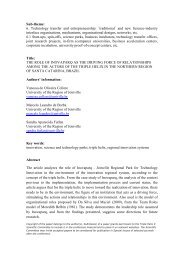TRIPLE HELIX noms.pmd
TRIPLE HELIX noms.pmd
TRIPLE HELIX noms.pmd
You also want an ePaper? Increase the reach of your titles
YUMPU automatically turns print PDFs into web optimized ePapers that Google loves.
P-052Entrepreneurship and Gender in Ghana - An Explorative Study of Institutionaland Structural BarriersJocelyn Sackey, Ylva Fältholm, HakanYlinenpää, Luleå University of Technology, SwedenAbstractIn most countries, the challenge of stimulating and promoting entrepreneurship is a top priority on the policy-making agenda. InGhana, several support programs have been initiated by various governments since the country's independence in 1959, includingalso initiatives to stimulate and support women entrepreneurship. Despite of the fact that gender issues in Ghana have beengiven significant attention over the last decade in particular; and that Ghana ranks relatively high in terms of gender equality,there remain a number of legal, administrative, and institutional barriers that impede start-up and growth of women-ownedbusinesses. The aim of this study is to explore institutional and structural barriers to business start-up and growth in Ghanawith a specific focus on women entrepreneurs. Additionally, by applying a social constructionist approach to gender andentrepreneurship, the aim is also to investigate gendered conceptions of Ghanaian entrepreneurship to provide a basis for policymeasures that acknowledge such conceptions as well as gendered institutional and structural barriers. Employing a qualitativeapproach, data has been obtained through in-depth interviews with different stakeholders; comprising government and otherofficials associated with entrepreneurial policy and structural design and implementation, as well as individual entrepreneurs(both women and men) whose enterprises cut across various segments of the economy. Interviews were carried out with 25women and eight men entrepreneurs, eleven representatives for policy and different support organizations as well as with five'gender advocates'. Additionally, policy documents on innovation and entrepreneurship were studied. Preliminary data analysesreveal four basic themes emerging from the empirical data, reflecting conceptions of both entrepreneurs and policymakers. .The first theme, conceptions of Ghanaian survivalist enterprises reflect the view of the interviewees of Ghana as a country withvast possibilities of doing business. At the same time, it is conceptualized and described as a "sales shop" because of the factthat buying and selling rather than producing and adding value are encouraged and supported. As the economy is not largeenough, however, all of these businesses can not be supported. There is also the conception among the interviewees thatindividuals own businesses as a way to survive, rather than because they are "real'" or "true" entrepreneurs.The second theme, conceptions of the Ghanaian entrepreneur, is based on the view among the interviewees of the Ghanaianentrepreneur as short-sighted, as one that "cut corners" and is consumption oriented. The entrepreneur is described asindividualistic, but also as lacking needed business skills. They are seen as very difficult to deal with; as unwilling to learn or tomove from status quo. Also they are described as uninterested to be subject to governance structures. At the same time,women are seen as better and more successful than their men counterparts, as having more passion, being more nurturing, asnot running off and as more conscientious. This means that some of the conceptions of the Ghanaian entrepreneur can bedescribed as gendered.The third theme, conceptions of the nature of the Ghanaian business environment, is represented by the interviewees' depictionof the Ghanaian business environment as harsh, requiring an individual to have strong passion, and be very "pushy" to succeed.They also believe that the labour market is unstructured and that labour itself is very problematic. Cost of doing business is alsovery high and there are numerous socio-cultural difficulties in establishing a viable business venture. Again, according to theinterviewees, there is no policy on entrepreneurship that ensures steady growth of business and development and in caseswhere there is some form of policy these do not support small businesses. There are also institutional failures and lack ofaccess to finance.The fourth theme, conceptions of new policy direction, illustrate interviewees' view that there should be a complete shift towardssupporting small businesses; that Ghanaians must develop their own concepts for entrepreneurship interventions and thatthese support interventions must be programmed. According to the interviewees the President of Ghana "should take upenterprise development as his baby on his lap and make sure that that baby grows". There is for example a need for programsstimulating and supporting women in the informal productive sector. Instead of "throwing monies" at women such programsshould aim at promoting entrepreneurship training and education.In this paper, by drawing on concepts from institutional theory and entrepreneurship research, our data will be analyzed toprovide a better understanding of the challenges economies such as Ghana is facing in the quest for a more entrepreneurial anddynamic economy. By comparing with previous research addressing women entrepreneurs in other similar countries this studywill offer important insights into the barriers and opportunities to entrepreneurship prevailing in developing economies such asGhana, and a more knowledge-based input to future policy initiatives in this specific field.In addition to this approach, we will also, by drawing on social constructionist approaches to gender and entrepreneurship,discuss how to develop policy measures that, rather than restricting Ghanaian women into 'entrepreneurial ghettos', aim atdeveloping sustainable gender mainstreaming interventions in the field of entrepreneurship in Ghana.Madrid, October 20, 21 & 22 - 2010292



